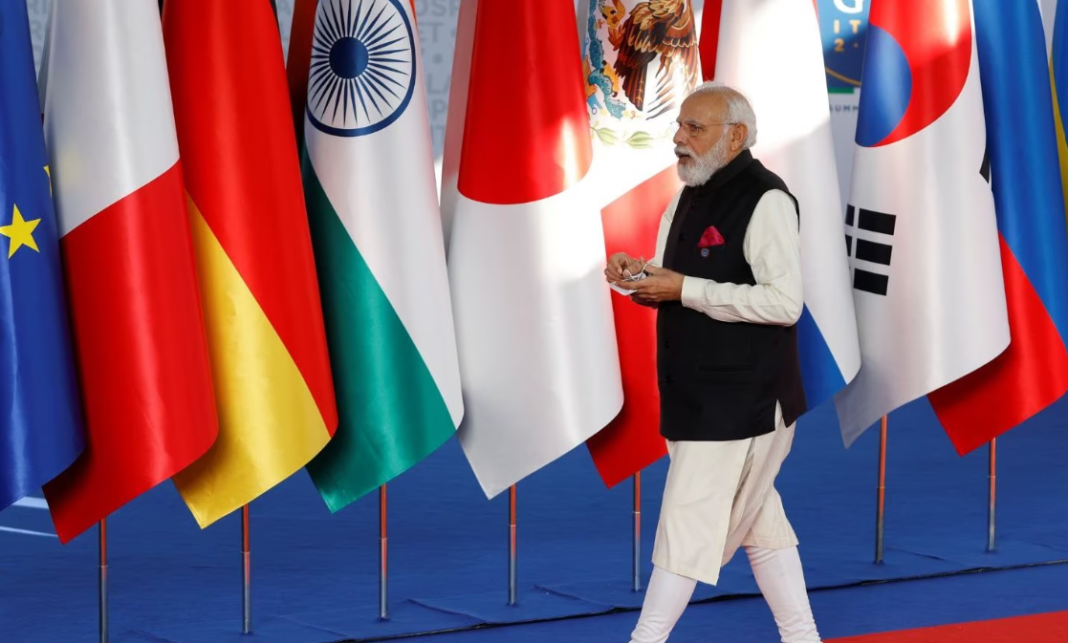India’s G20 Presidency: India’s current position as the president of the G20 represents a pivotal moment in global politics. With Prime Minister Narendra Modi at the helm, the country is actively influencing various significant global discussions. Among the prominent issues are the transformation of multilateral development banks, integrating the African Union, and a pronounced focus on climate action. This leadership underscores India’s dedication to addressing the vital concerns of the Global South.
In a recent, in-depth interaction with Business Today, PM Narendra Modi opened up about India’s role and vision for the G20. The interview took place at his expansive and elegantly designed office at 7, Lok Kalyan Marg.
Key Takeaways from the Interview:
India’s Global Role: PM Modi articulated the unique opportunity that India, under its G20 presidency, has in addressing critical global issues. The emphasis is on uniting the world to act collaboratively on shared challenges.
Digital Public Infrastructure: The Prime Minister expressed pride in how India’s digital public infrastructure has gained global admiration. He pointed out how such infrastructure can transform public service delivery and empower citizens.
Manufacturing Prowess: Modi highlighted India’s potential to emerge as a global manufacturing hub. With its vast pool of skilled labor and increasing policy support, the country is well-positioned to attract businesses and investments.
Concerns of the Global South: India’s leadership in the G20 underscores its commitment to voicing the concerns of the Global South. PM Modi’s tenure reflects a dedication to ensure that these concerns are not just heard but acted upon in global forums.
Climate Action: With climate change becoming a pressing global concern, PM Modi shed light on India’s commitment to sustainable practices and its role in the G20 to champion global climate action initiatives.
Engagement with African Union: India’s move to integrate the African Union signals its broader vision of inclusive global dialogue. It recognizes the importance of Africa in the global scenario and seeks to strengthen partnerships for mutual growth.
In summary, the interview provided a comprehensive look into PM Narendra Modi’s vision for India’s role in the G20 and the broader global context. It reiterates India’s commitment to playing an active role in shaping a collaborative and inclusive future for the world.
India's G20 Leadership: A Boost for its Economic Ascendancy and Stature on Global Economic Stages?
India’s role in the G20 isn’t just about perception but about the tangible steps the country has taken and the concrete results achieved. The idea that a summit might be utilized merely as an image-building exercise dismisses the deeper intricacies of global financial dynamics.
Financial World’s Viewpoint: The financial realm isn’t swayed by mere perceptions. It relies on actual performance and results. Any notion to the contrary diminishes the importance of real accomplishments.
India’s Track Record: The way India combated the Covid-19 pandemic, not only within its borders but also in assisting other nations, stands testament to its commitment and capability. The nation’s economic prowess, marked by its rapid growth, coupled with the robustness of its financial and banking sectors, underscores its trajectory on the global stage.
Understanding G20’s Role: The G20 summit holds importance beyond national interests. In the aftermath of the Covid-19 pandemic, the world faced unprecedented challenges. The G20, representing the world’s major economies, naturally harbors concerns about the future trajectory. The summit emphasizes a shift from mere economic metrics to a more human-centric approach to development.
Shifting Paradigms: During India’s G20 presidency, there has been a noticeable shift in discussions. Old stances are being reconsidered, and fresh perspectives are emerging. The G20 platform is enabling both developed and developing nations to unite, aiming to find collective solutions to pressing global issues.
Inclusivity and Participation: India’s G20 leadership has been marked by unprecedented participation levels and unparalleled candidness from participating nations. The inclusion of the African Union is a testament to India’s commitment to fostering inclusivity.
A New Global Order: India, through its G20 presidency, is poised to be a significant influencer in the crafting of a new global order. The nation aims to be the catalyst that brings together varying global perspectives to pave the way for a brighter, collective future.
To summarize, India’s role and influence in the G20 transcend the notion of image-building. It’s about tangible achievements, collective growth, and steering the world towards a promising future.
India's G20 Vision: PM Explores the Key Goals and Outcomes of the Nation's Presidential Tenure?
India’s role in the G20 is being widely recognized as a pivotal one, emphasizing unity, sustainable growth, and technological advancement. Here’s a breakdown of the key messages from the conversation:
Challenges with Multilateral Institutions: The credibility of global multilateral institutions is waning due to a lack of reforms, leading to the rise of smaller, more focused groups. In this changing landscape, the world’s eyes are firmly set on the G20.
G20 as a Beacon of Hope: The G20 is being viewed as a potential force to address the present gaps in global collaboration. The collective is anticipated to drive policies that impact the entire human race. Under India’s presidency, the G20 is laying the groundwork for this promising role.
Voice of the Global South: India’s leadership is ensuring that the concerns and voices of the Global South are well-represented and heard. This inclusionary approach ensures that the G20 is not just about the major economies but about global inclusivity.
Empowering Women: Gender equality and women-led development are being given significant importance. The emphasis is on recognizing and leveraging the pivotal role women play in sustainable growth.
Embracing Technology: In a world that’s rapidly digitalizing, the G20, under India’s guidance, is focusing extensively on technological advancements, especially in areas like Artificial Intelligence (AI) and Digital Public Infrastructure (DPI).
Green Initiatives: Emphasizing the concept of ‘One Earth’, India’s G20 presidency is championing sustainable, eco-friendly initiatives that can pave the way for a greener future.
Inclusive Growth: The notion of ‘One Family’ reflects India’s commitment to holistic growth, ensuring that no nation or community is left behind.
Future-Ready Collaborations: Aligning with the idea of ‘One Future’, the G20 is not only echoing the concerns of the Global South but is also diving deep into cooperative ventures in technology, especially in AI and DPI.
In essence, under India’s G20 presidency, the focus is on creating a unified approach to address global challenges. It embodies a vision of a world that stands together, grows together, and leverages technology for a sustainable tomorrow.
Tackling Climate Urgency: PM Shares Ambitions for G20 Amid Rising Extreme Weather Challenges?
Recognizing the urgent need to address the impending climate crisis, there are key messages embedded in the provided response:
Acknowledging Human Impact: The primary step towards finding a solution is accepting our responsibility. Once we recognize the human footprint on environmental degradation, it sets the stage for proactive remediation.
Overcoming a Restrictive Attitude: The global dialogue on climate change is predominantly restrictive, emphasizing limitations and fostering an environment of criticism. To instigate action, the discourse needs to shift from what shouldn’t be done to what can and must be done.
United We Stand: Climate change is a global challenge, requiring a unified approach. Instead of indulging in blame games, nations should come together to collaboratively address the pressing issues.
Balancing Act: It’s essential to strike a balance between preserving the planet and ensuring the well-being of its most vulnerable inhabitants. India’s ‘One World, One Sun, One Grid’ initiative exemplifies this balanced approach.
Being Action-Oriented: While intentions matter, actions have a tangible impact. Developing nations often lack the technological resources and funds to mitigate climate change. The developed world needs to facilitate technology transfers and mobilize climate finance to bridge this gap.
Tailored Strategies for Climate Action: Under its G20 presidency, India has emphasized the need for flexible global policies. Recognizing the unique challenges faced by each nation, there’s a push for diverse solutions ranging from green technology standards to carbon taxes.
The Power of Mass Movements: Historically, significant transformations have been the result of collective action. India’s Mission LiFE aims to galvanize public participation, fostering a change in lifestyle that’s environmentally conscious.
To summarize, addressing the climate crisis requires a collective, collaborative approach. By acknowledging our role in the current predicament, emphasizing actionable solutions, and harnessing the power of collective action, we can pave the way for a sustainable future.
African Union in G20: PM Discusses the Impact and Vision for Africa's Role in the Emerging Global Landscape?
The discourse provided sheds light on a nuanced understanding of the significance of the Global South, primarily Africa, in the scheme of international affairs. Here’s a comprehensive breakdown:
Emphasis on International Collaboration: The grand India-Africa Summit of 2015 was a significant event showcasing India’s intent to foster deep relations with the African continent. However, the summit’s relevance was perhaps not captured adequately by the media.
Global South’s Potential: Countries of the Global South are more than just developing nations; they are essential players in shaping global dynamics. Recognizing and acting upon their potential can steer global development agendas in a positive direction.
Ground-breaking Initiatives: As the Chief Minister of Gujarat, the hosting of the Africa Development Bank Summit outside Africa highlighted the commitment to inclusive global dialogue.
Vasudhaiva Kutumbakam: Translating to “the world is one family,” this ancient Indian philosophy underscores the importance of an inclusive approach to global affairs.
Voice of the Global South: The G20 presidency’s inaugural event, the Voice of Global South Summit, was pivotal in integrating the priorities and concerns of the Global South into the broader G20 agenda.
African Union’s Role in G20: The push to induct the African Union as a permanent G20 member epitomizes the need for a more inclusive international decision-making framework. This step aims to rectify the historical oversight and offers Africa a deserved platform on the global stage.
Championing Africa’s Role: Africa’s relevance in global governance mechanisms cannot be overstated. India’s stance seeks to champion the continent’s rights and concerns, strengthening the bond shared by the two entities.
Crafting a Holistic World Order: To foster a balanced, equitable global order, it’s paramount to ensure that all countries, irrespective of their economic stature, have a voice. This perspective is vital for sustainable global solutions.
To conclude, India’s G20 presidency is an exemplar of its commitment to global inclusivity. By seeking to bolster the voice of the Global South, particularly Africa, it underscores the tenet that for a harmonious global future, every nation, big or small, must be an equal stakeholder.
Read Next > Chess Prodigy R Praggnanandhaa































